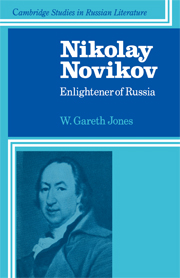Book contents
- Frontmatter
- Contents
- Acknowledgements
- Foreword
- 1 Noble beginnings (1744–69)
- 2 A family of satirical weeklies (1769–73)
- 3 The Drone (1769–70)
- 4 Imperial patronage (1770–3)
- 5 In search of the Russian reader (1773–5)
- 6 Disillusions and doubts (1774)
- 7 The historian (1773–91)
- 8 The freemason (1775–80)
- 9 A move to Moscow (1779–83)
- 10 The Russian reader discovered (1779–82)
- 11 The Typographical Company (1784–91)
- 12 Martyrdom and meditation (1791–1818)
- Afterword
- Notes
- Bibliography
- Index
5 - In search of the Russian reader (1773–5)
Published online by Cambridge University Press: 05 November 2011
- Frontmatter
- Contents
- Acknowledgements
- Foreword
- 1 Noble beginnings (1744–69)
- 2 A family of satirical weeklies (1769–73)
- 3 The Drone (1769–70)
- 4 Imperial patronage (1770–3)
- 5 In search of the Russian reader (1773–5)
- 6 Disillusions and doubts (1774)
- 7 The historian (1773–91)
- 8 The freemason (1775–80)
- 9 A move to Moscow (1779–83)
- 10 The Russian reader discovered (1779–82)
- 11 The Typographical Company (1784–91)
- 12 Martyrdom and meditation (1791–1818)
- Afterword
- Notes
- Bibliography
- Index
Summary
Assurément, c'est au XIXè siècle que le principe de nationalités se proclame, que les nationalismes s'affirment: mais ils se préparent au siècle précédent. Qu'il est profond, qu'il est vigoureux, le sentiment obscur qui a précédé l'idée.
Paul HazardThe Society for the Translation of Foreign Books
Even by its title Novikov's Society for the Printing of Books clearly admitted an association with the Society for the Translation of Foreign Books, founded and financed by Catherine in 1768 with V. Orlov, A. Shuvalov and G. Kozitsky as its directors. By 1772 the latter society had published over forty titles, including extracts from the Encyclopédie, Montesquieu and Voltaire. This accounted for the encouraging ‘news’ from Millionnaya Street (St Petersburg's main thoroughfare and book-trading centre) in the Painter's sixth number of a ‘great change in bookselling’: whereas previously there had been complaints that there were few serious books of enlightenment available in Russian, now many of the best foreign works had been translated. Two further ‘news items’ served as a commentary to this intelligence. Moscow reported an epidemic as deadly as the recent outbreak of plague – the spurning of Russian scholars, artists and artisans in favour of foreigners. ‘Yaroslavl’, however, thanks to its recent output of comedies ‘exactly in our manners’ would save the Russian gentry from the plague of Gallo-mania as surely as isolation in that town had saved Russians from disease.
- Type
- Chapter
- Information
- Nikolay NovikovEnlightener of Russia, pp. 82 - 97Publisher: Cambridge University PressPrint publication year: 1984



